South Korea, like many other East Asian countries, has a long history of tea culture. Korean teas are enjoyed not only for their taste, but also for their medicinal properties and healthful benefits.
Despite the popularity of coffee in Korea, tea is ingrained in the culture and remains a part of everyday life. Korean teas are considered a meal accompaniment, a home remedy for common ailments, and generally thought to uplift the mind, body, and spirit.
While green tea is commonly regarded as the staple tea in Korea, there are hundreds of varieties of tea here. These days you don’t even have to go to a tea house to get tea from Korea; many dining establishments carry an assortment of Korean teas or you can easily find the best teas in Korea online, thanks to stores like H-mart.
This article covers the best South Korean teas, ranging from Korean green tea and honey citron to toasted rice and jujube - but first let’s talk about how tea and the tea culture in Korea came about.
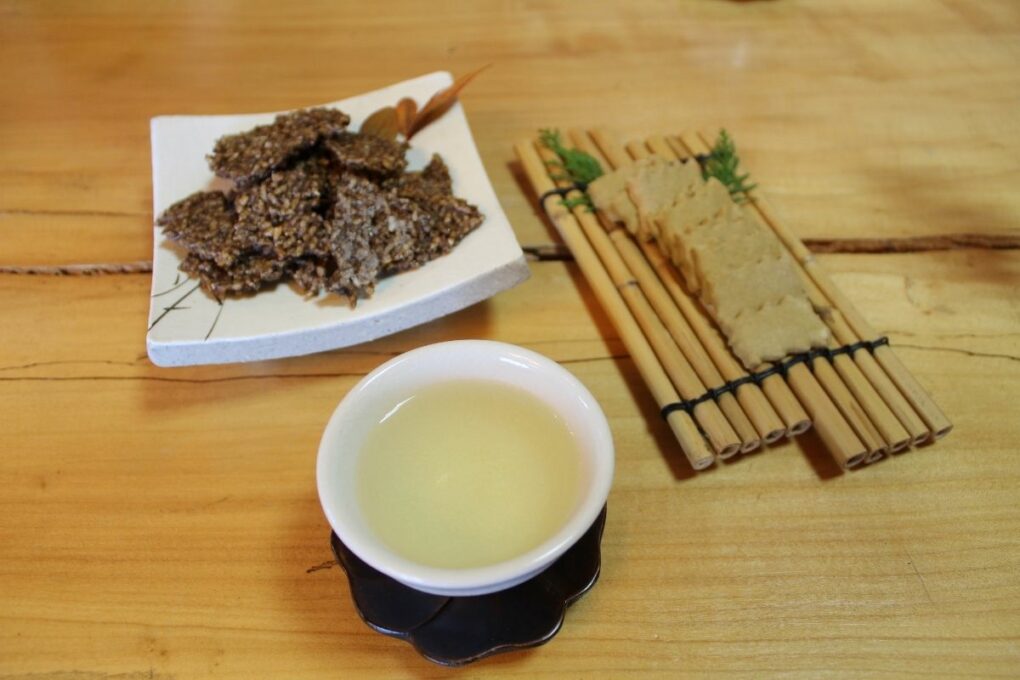
Jump to:
📜 History of Tea in Korea
In the year 1905, tea was officially classified under the botanical name Camellia sinensis. All tea comes from this one tea tree, which actually originated in China. Korean tea culture began during the Three Kingdoms Period (18 BC - AD 660), when Chinese tea was imported into the country.
According to the Gaya Record, the legendary Queen Heo Hwang Ok received a Camellia sinensis Plant as a gift and planted it on Changwon's Baegwolsan Mountain. Labrador tea and Fruit teas such as omija-cha (magnolia berry) and gugija-cha (goji berry) teas have been used since Early Korea (Samhan Era) and the Three Kingdoms Period.
According to the early chronicle-histories known as Samkuk-yusa and Samkuk-sagi, Queen Seondeok of Silla (ruled 632-47) drank green tea, and King Munmu ordered tea to be used during ceremonial offerings in 661.
In 828, King Hungdok obtained tea seeds from Tang China for planting, and King Sinmun later advocated the use of tea to purify the mind. Buddhist monks brought with them Chinese tea culture and began the systematic method of planting tea bushes throughout the country.
Korean tea was either whisked in a bowl (Sung Dynasty) or steeped in water in a pot (Ming Dynasty). Tea was the subject of some of Korea's oldest recorded poems during the Koryo Kingdom (the 10th-13th centuries).
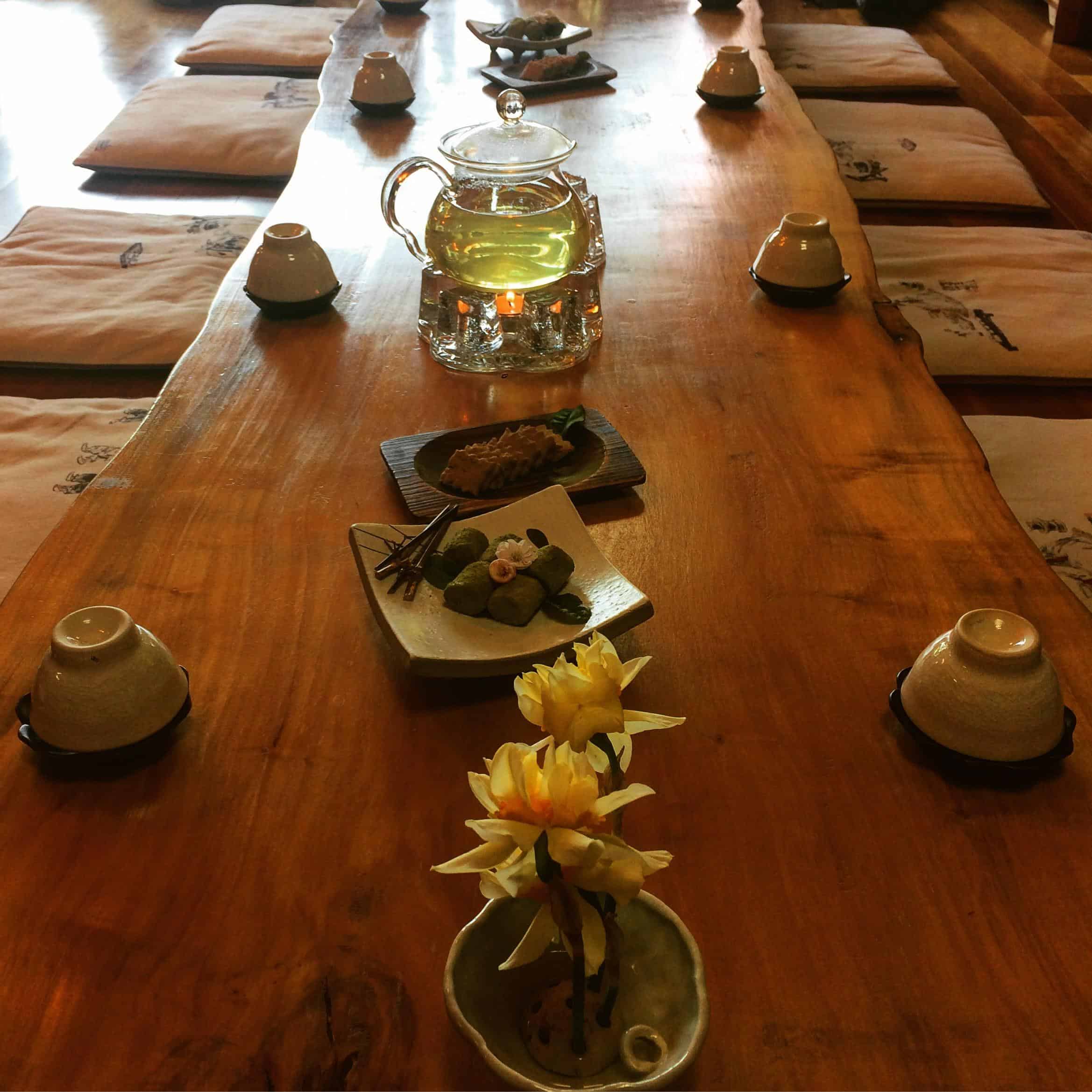
While Korean tea culture began earlier, in the Silla dynasty, it only lasted until the Koryo (Goryeo) Dynasty. Buddhist traditions and practices declined in the latter half of the Goryeo period due to corruption and the rise of strong anti-Buddhist sentiment.
Tea was drunk by royalty for leisure, and was used in ancestral and other ceremonial offerings. Over time, Buddhist traditions were replaced with Confusian ones. Ceremonial tea drinking almost vanished if it weren't for scholars and the literati who continued with traditions of dasi (writing poems about tea) and dahoe (tea gatherings).
Korean tea culture was secularized during the Joseon Dynasty, as the royal family and aristocracy used Korean tea for ceremonies and rites. By the end of this period, Commoners had already adopted the practice of using tea for jesa (ancestral rites).
Korean Tea Ceremonies or Darye (“charye”) literally means tea etiquette or tea rite, and was synonymous with jesa. Similarly, there were regular honcha ceremonies in which cups of green tea were offered before the Buddha statues in temples.
The first modern Korean tea house was eventually established in 1924, as tea's popularity waned. But, thanks to Choi Beom Sul, Korean tea and tea traditions regained interest in the ‘70s.
Tea, derived from Buddhist ritual offerings, was used in ancestral and national (Yeondeunghoe and Palgwanhoe) ceremonies. Choi Beom Sul, the Head Monk of Dasolsa Temple shared traditional tea etiquette which may have led to what we now know and practice regarding Korean tea traditions.
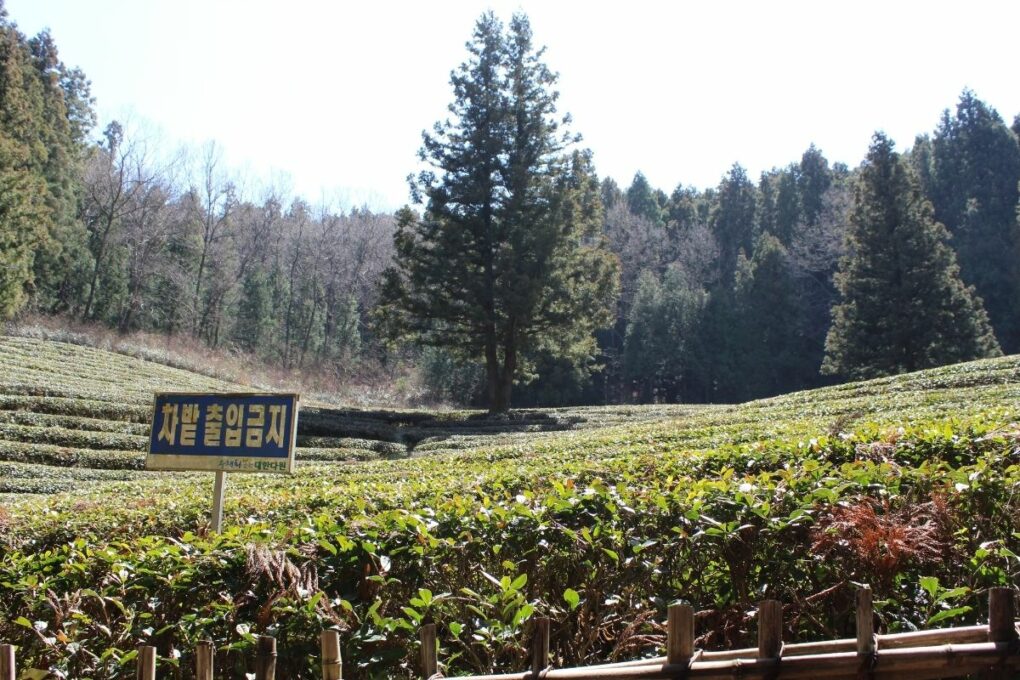
🍵 Modern Korean Tea Culture
Historically, tea drinking became ingrained in daily life, evolving from spiritual and royal traditions of Buddhist monks, the royal family, the nobility, and scholars. The manner of serving and drinking tea became an important part of family and guest etiquette.
Present day darye is less formal and more warm, aimed at offering friends a relaxing tea drinking and harmonious experience. Many restaurants serve grain tea (like brown rice or barley tea) instead of plain water to their guests, and at home, traditional teas made of various ingredients are commonly consumed both hot and cold.
Tea drinking is an experience that requires all five senses, in Korean culture. Korean tea is typically consumed with both hands holding the cup, but this is not always necessary. The first step is to examine the color of the tea, followed by smelling its fragrance.
The first sip is to taste the tea with the tongue, then experience the flavor in the throat, and finally, enjoy the lingering aftertaste in the mouth. Tea is said to combine various tastes in varying degrees of saltiness, sweetness, sourness, and bitterness, especially the infamous ‘5 flavor tea’ (omija).
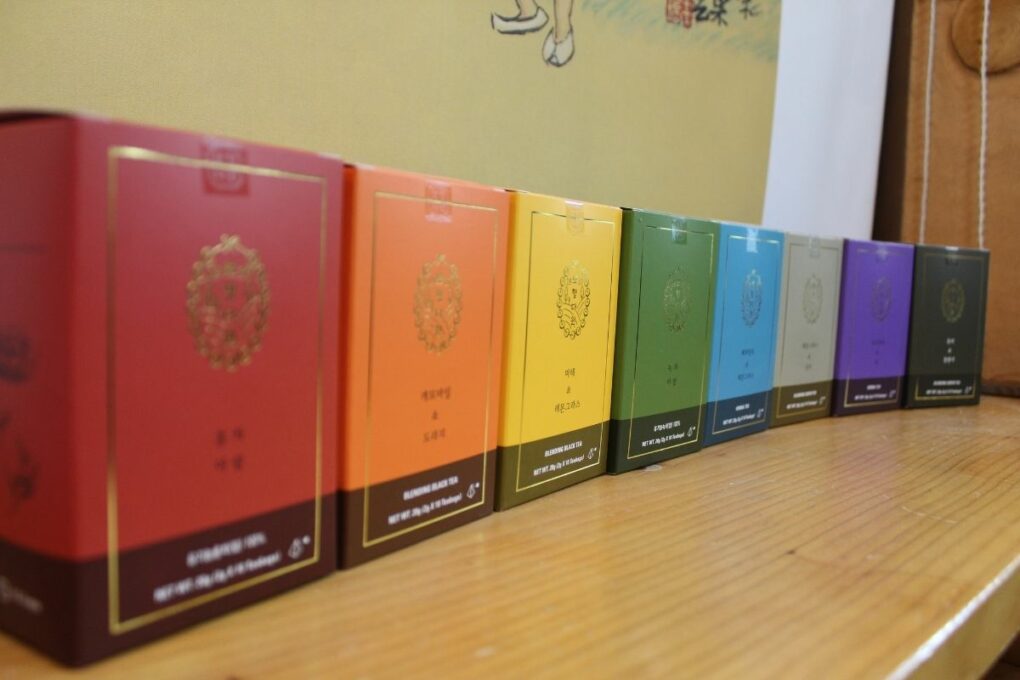
The three Daryes or Korean traditional tea ceremonies:
- Royal Darye - This Darye is conducted in silence, lasts for up to 8 hours, and is done in the presence of the king. However, the king doesn’t partake of the tea in case it is poisoned, so this type is mostly for show.
- Seonbi Darye - This is another Darye that is performed in silence. It is for Korean Confucian scholars, usually composed solely of men. However, women can also participate in this tea ceremony, in modern times.
- Friends Darye - This is the most relatable Darye, similar to common afternoon tea in the West. Unlike the previous two types, this Darye is a more casual experience that is best shared among family and friends.
Darye tea is typically served in beautiful pottery and elegant Korean tea cups. Traditional pottery is fired in kilns with porcelain, such as the beautiful Goryeo Celadon porcelain from Korea's Goryeo Dynasty (918-1392).
Korean pottery artisans were so skilled that Japanese pottery was heavily improved by some of the country’s craftsmen having relocated to the neighboring East Asian nation in the 1500’s. Traditional Korean tea is chosen in consideration of body constitution and state of health.
It's important to remember that not all Korean teas are sourced from the original tea tree, Camellia sinensis. Many popular picks are "tea" infusions or non-coffee beverages (whether hot or cold) crafted from flowers, roots, grains (or seeds), or fruits.
There are numerous flavors, blends, and herbs to choose from, and the best Korean tea brands offer a variety of options. The five types of proper Korean teas are leaf teas, grain (or seed) teas, flower teas, fruit teas, and root teas.
Let’s take a closer look at the best South Korean teas, at least according to domestic popularity.
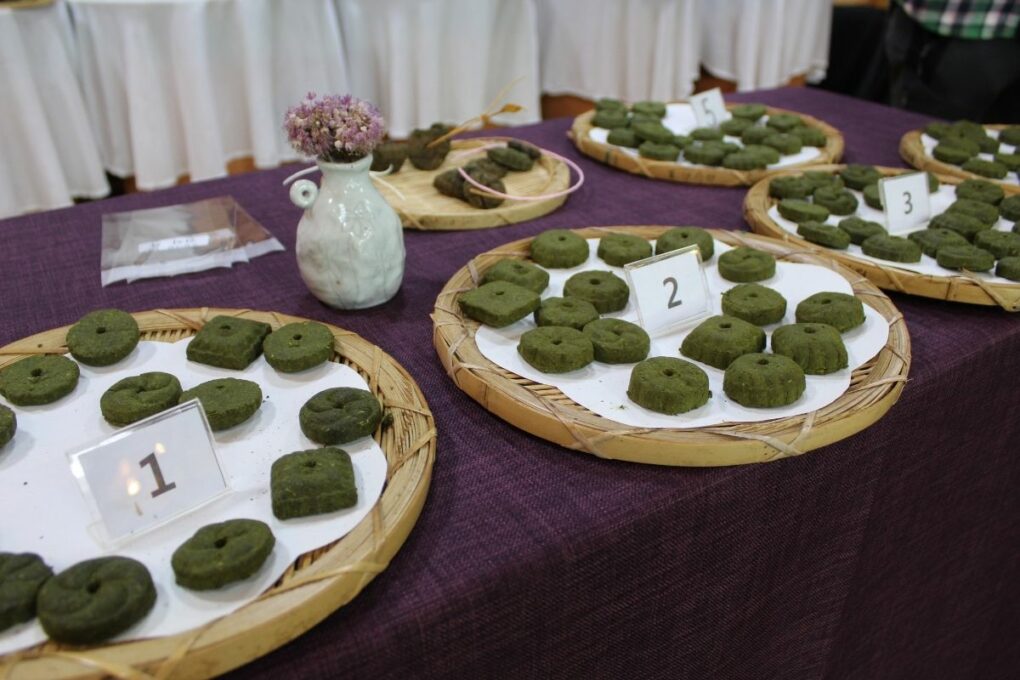
🍶 Most Popular Korean Teas
Ottogi Pinenut, Walnut, & Job’s Tears Tea
Type of Tea: Powdered
Only in Korea?: No, OTG New York
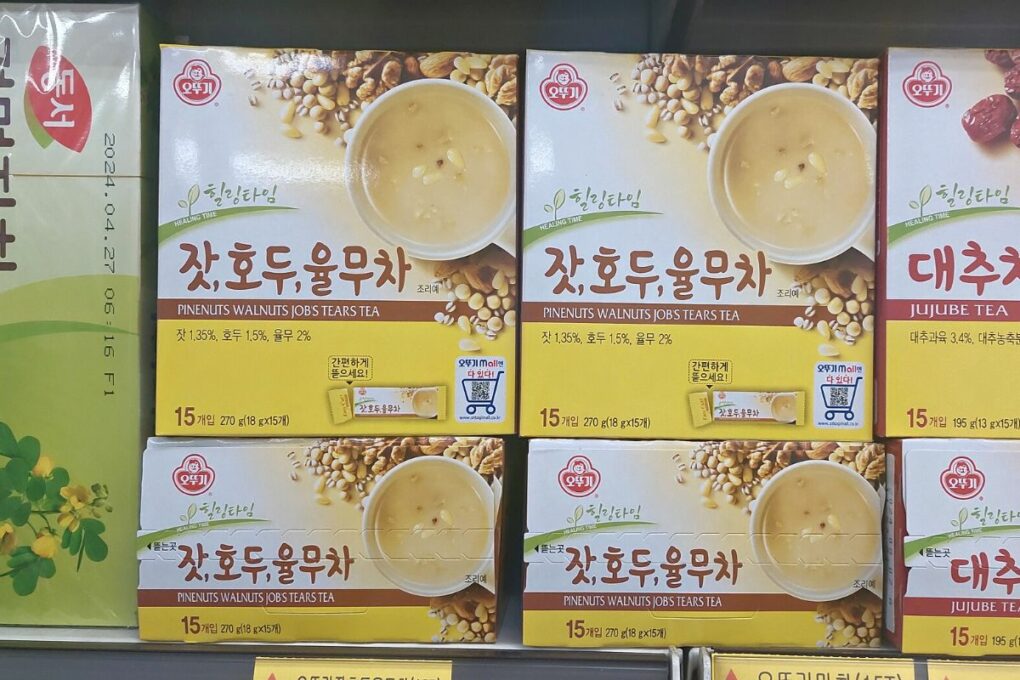
Great for all ages, Koreans love this flavored instant tea's rich and savory taste. The unusual combination of sunflower seeds and peanut sets this tea apart from regular Job's tears, though keep in mind that it comes with sugar and creamer already added. Many people pair this with street food in the evenings since it's caffeine-free.
Ottogi Jujube Tea
Type of Tea: Powdered
Only in Korea?: No, Instacart
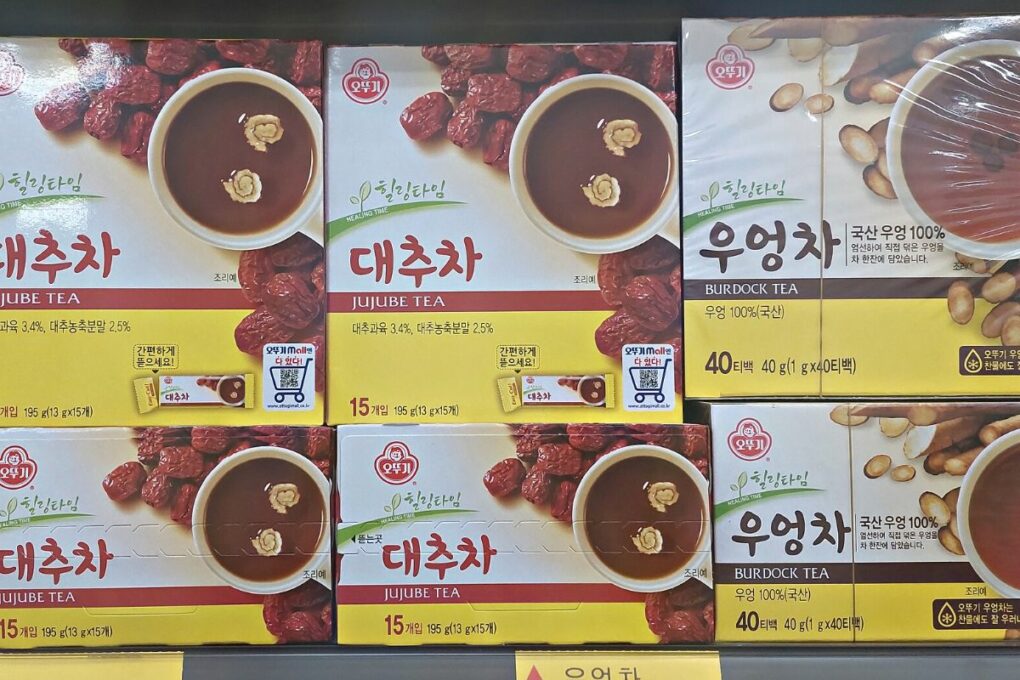
Jujubes are a rich source of plant fiber and are also very low-calorie. If you’ve never tried jujubes, this Korean jujube tea tastes like apples and can get a bit sweet or tart depending on your taste buds.
Full of vitamin C and fiber, this tea can help boost immunity and stabilize blood sugar levels. But what makes this tea so well-known amongst Koreans is that it’s said to help you sleep better at night.
TiO Iced Tea
Type of Tea: Powdered
Only in Korea?: No, Daebak
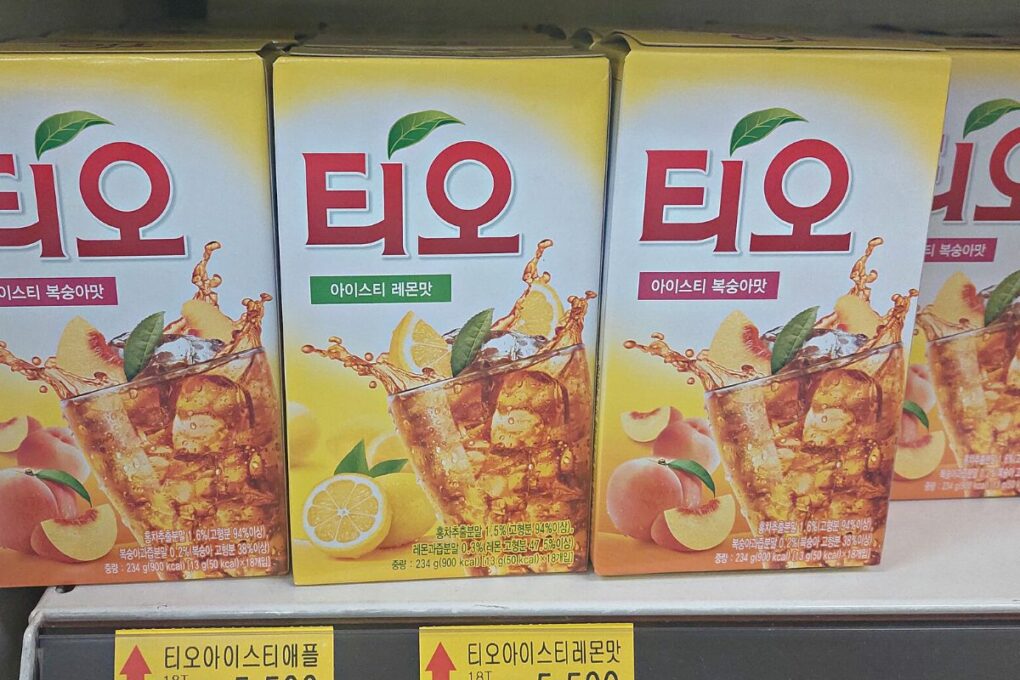
Ever wondered what Korean iced tea tastes like? Similar to the American version, this stuff is very light and refreshing. What people love about it is that it doesn’t contain a lot of sugar and has gentle hints of lemon flavor. Even though people can enjoy this year-round, most of it is sold in the summertime.
Yeonnip-cha (연잎차, Lotus Leaf Tea)
Average Cost: ₩₩₩
Where to Buy: Ido Tea, Amazon, Aom Pharmacy
The young leaves of the lotus plant are heat-treated by steaming or roasting, and then dried to make lotus leaf tea. This is a tea that has been enjoyed for thousands of years and has a ton of benefits for the body.
Lotus Leaf Tea contains numerous vitamins and minerals. In addition to promoting digestive and circulatory health, it contains antioxidants that fight free radicals.
Sollip-cha (솔잎차, Pine Needle Tea)
Average Cost: ₩
Where to Buy: Amazon
The pine needles from the Korean red pine are used to make this particular tea. This non-caffeinated tea also has a pine leaf version known as baegyeop-cha. Pine needles for Korean pine tea are harvested from 10 to 20 year old trees in the cool months, usually December.
Pine needle tea contains five times the amount of Vitamin C found in lemons, and can help with heart disease, varicose veins, skin complaints, and fatigue. This tea is also high in Vitamin A, which is good for eyesight, hair and skin regeneration, and red blood cell production.
Taoist priests drank pine needle tea because they believed it extended their lives, and there is actually evidence that it may help slow the aging process.
🥭 Korean Fruit Teas
Gohyang Korean Jujube Han Tea
Type of Tea: Tea bags
Only in Korea?: No, Amazon
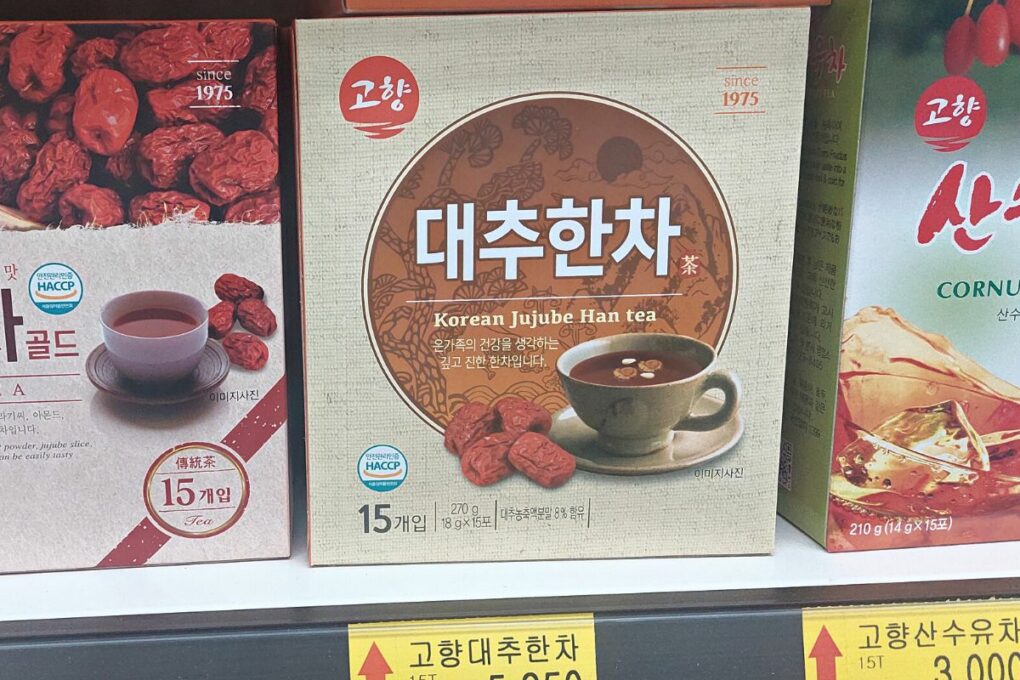
Another tea made with jujubes and various nuts, this authentic South Korean tea is a comforting and soothing drink locals enjoy at home.
It also has excellent flavor and smell and is packed with many antioxidants thanks to the main ingredient: Korean jujubes. Also, the packaging makes it a great present idea for your tea-loving friends.
Gohyang Cornus Fruit Tea
Type of Tea: Tea bags
Only in Korea?: Yes
Asian medicine practitioners swear by the benefits of the sour Cornus fruit to improve kidney and reproductive system function. This alleged benefit is why women love this drink; because it’s believed to soothe them on days their menstruation hurts and speeds up recovery after an illness.
Gohyang Schizandrae Fructus Tea (오미자)
Type of Tea: Tea bags
Only in Korea?: No, Amazon
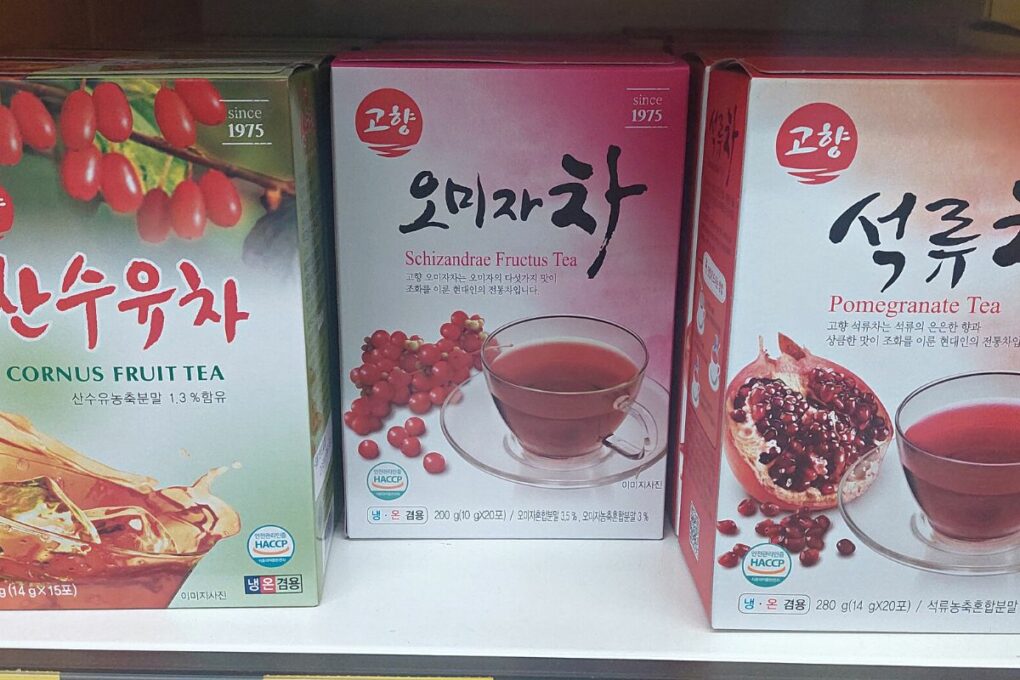
The Chinese have long-used the Schisandra plant to make traditional medicine that stimulates the body’s resistance to physical, environmental, and emotional stressors.
But what makes people want to try it in the form of a tea is that it tastes like the five different flavors: sour, sweet, bitter, savory, and salty. In Korea it's called 'omija tea,' and highly lauded for its complex flavor.
Seokryu-cha (석류차, Pomegranate Tea)
Average Cost: ₩₩
Where to Buy: Amazon
Pomegranate tea is a vibrant red sweet tea with a tart flavor. It's made with crushed pomegranate seeds, boiled pomegranate flowers, or by combining tea with pomegranate juice concentrate.
Pomegranates are well-known super fruits that can aid in skin tightening, which is why older Korean women tend to drink this healthy tea. It also helps to build muscle, improve the immune system, lower cholesterol, and prevent heart disease.
It's even said to be high in antioxidants, which help protect against certain types of cancer. This tea is available in stores, but pre-made versions are frequently mixed with mint, black tea, or green tea.
They can be sweetened as well, so choose teas that can be steeped for the best results, or reduce the sugar you add for a healthier cup. Take a look at this recipe.
Yuzu Honey Tea Syrup
Type of Tea: Jar syrup
Only in Korea?: No, Gochujar
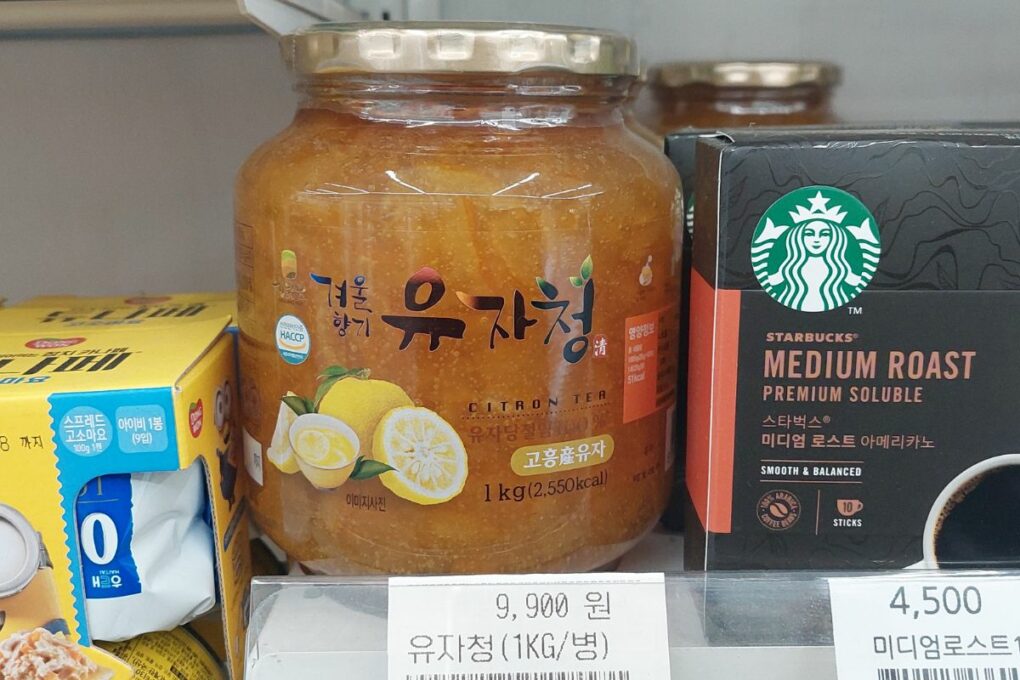
Yujacha is a tea made from yuzu fruit, with a fruity scent that makes the whole room smell better. It is also an excellent source of vitamin C, the secret ingredient behind healthy and supple skin. Plus, it helps make your morning oatmeal interesting, especially when paired with yogurt.
🍃 Best Korean Green Teas
Damtuh Cold Brewed Shine Muscat Green Tea
Type of Tea: Powdered
Only in Korea?: No, Now New World
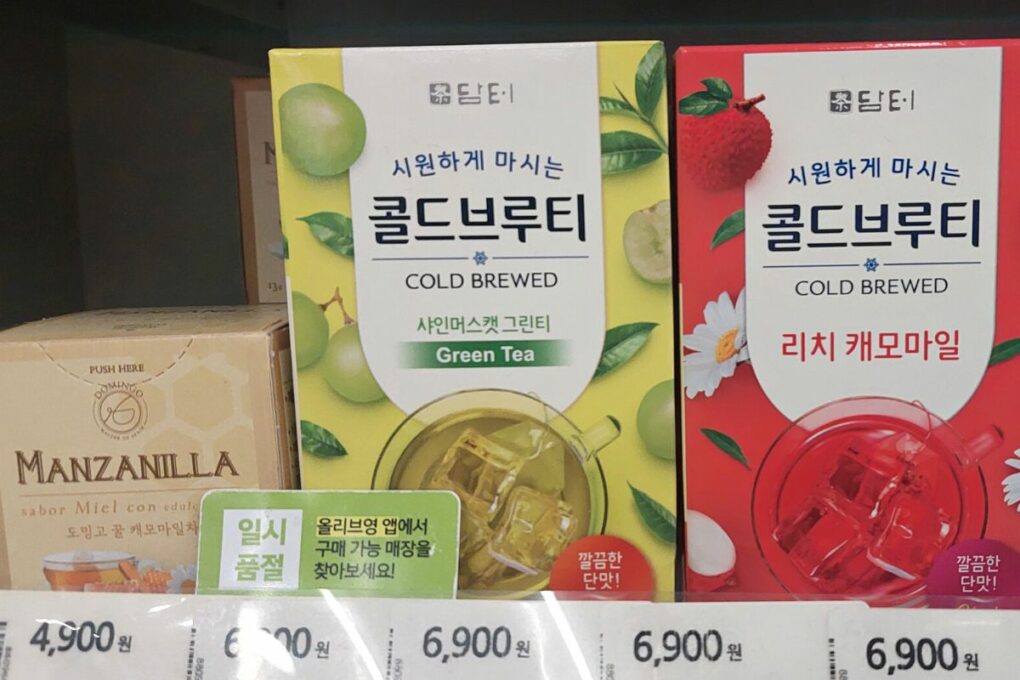
This cold cup of blended shine muscat and green tea is best enjoyed cool thanks to its tropical fruit flavor, which goes well with the summer weather. Moreover, this combination reinforces the immune system, lowers the risk of kidney diseases, assists in weight loss, and improves brain function.
Nok Cha Won Sonsunuk Cha (Pure Korean Green Tea)
Type of Tea: Tea bags
Only in Korea?: No, Amazon
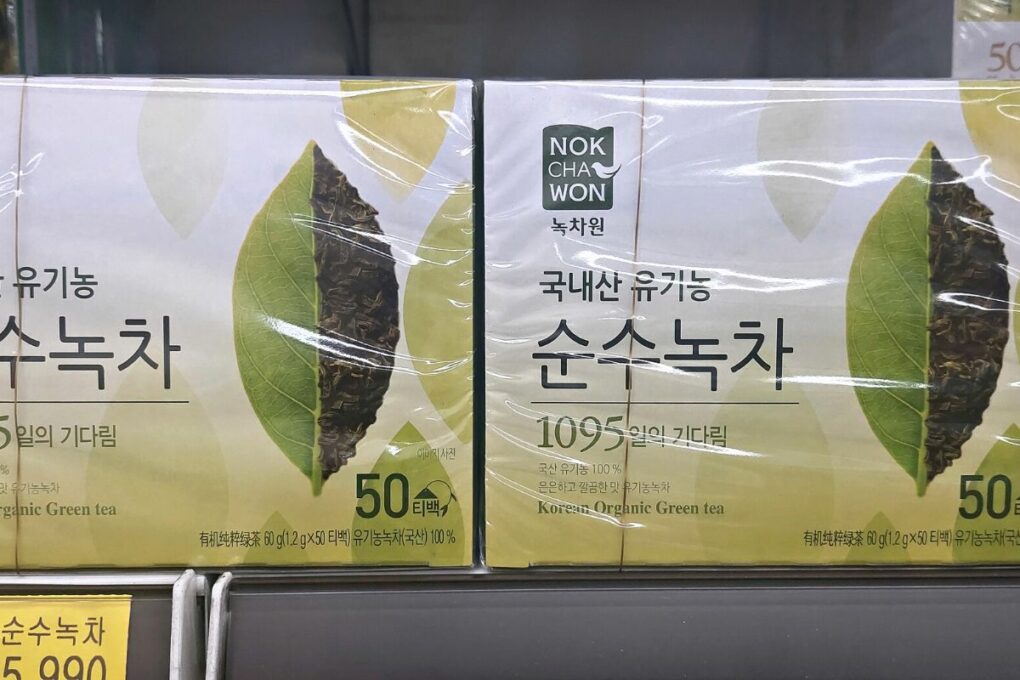
Nok Cha Won is a famous tea manufacturer known for producing green tea products of the highest quality. Always present in Incheon airport’s Duty Free branch, this is an excellent gift for people who enjoy luxury green tea in the evening, especially since it has a relaxing nutty undertone of Korean tea leaves.
Nok Cha Won Green Tea Powder
Type of Tea: Tea bags
Only in Korea?: Yes
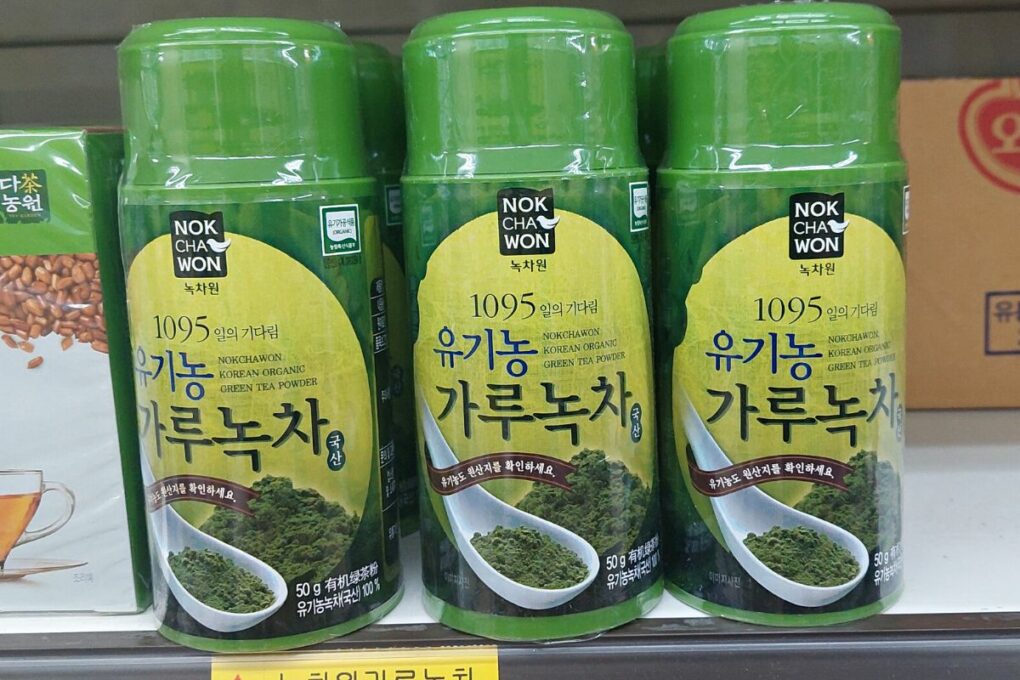
Nok Cha Won not only produces a mean bag of tea, but they also make quality tea powders. The green tea flavor, known worldwide by the Japanese word matcha, is a crowd favorite since it is neither too sweet nor bitter. It tastes great with milk, or you can use it to make a creamy matcha latte.
💊 Best Korean Teas for Digestion
LENITH Songwon Dandelion Tea
Type of Tea: Tea bags
Only in Korea?: No, Amazon
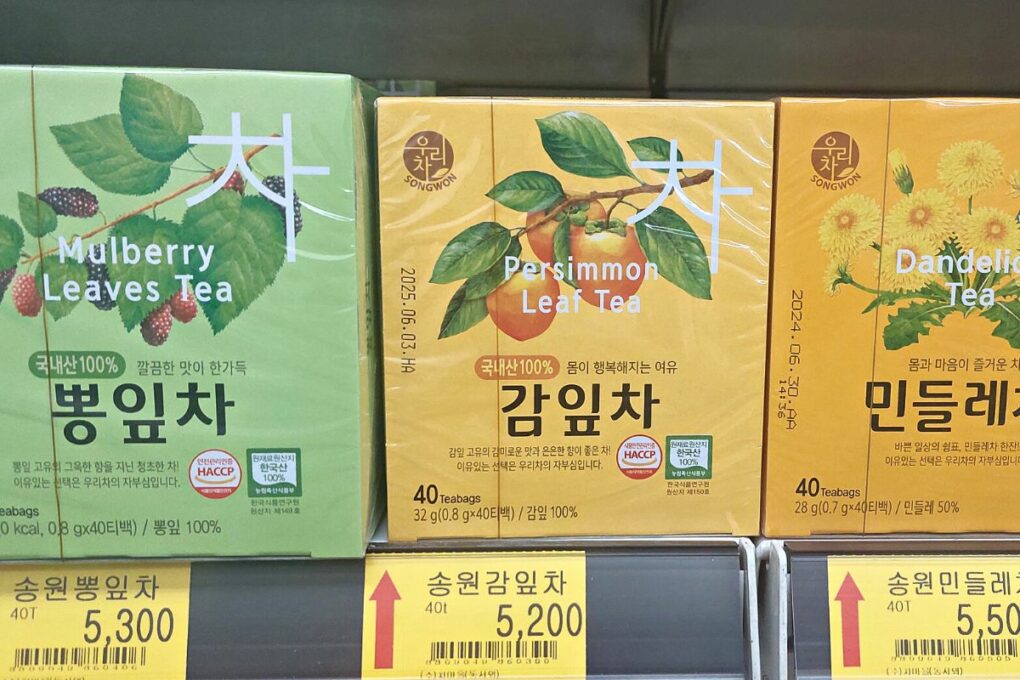
While some people may think dandelion root is too strong for a tea, due to its inherent bitterness, this brand has found a way to make the taste delicate and mild.
But if you add some fresh mint or lemon balm to the mix, it tastes even better. Plus, if you're looking to age backwards, this is the best Korean tea to obtain the antioxidants you need to achieve this.
Nok Cha Won Korean Red Ginseng Tea
Type of Tea: Jar syrup
Only in Korea?: No, Mighty Depot
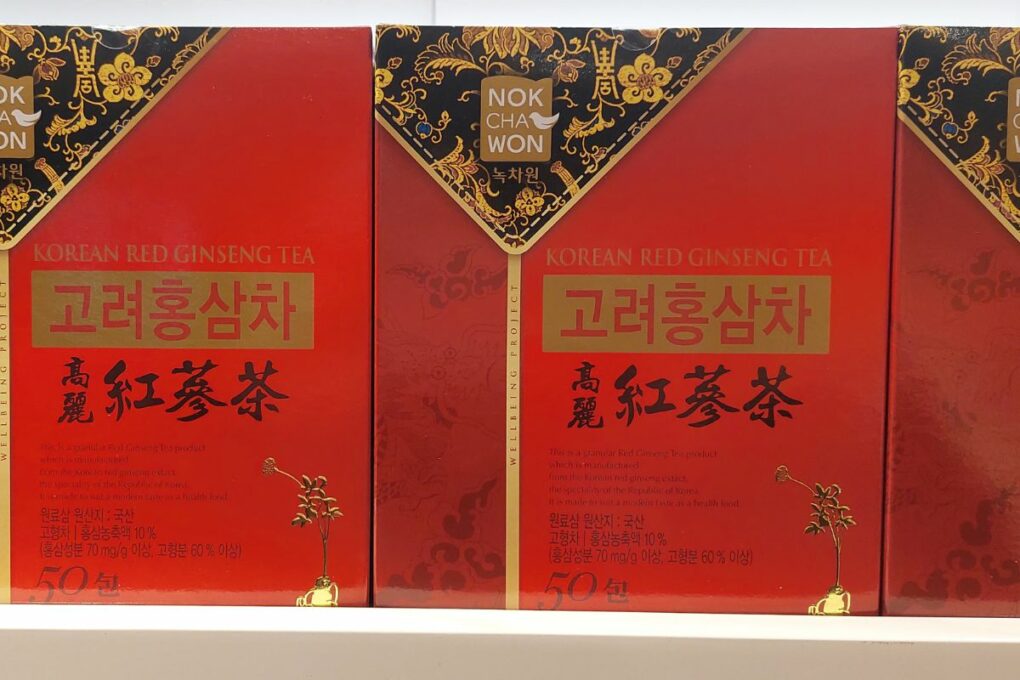
If you haven’t tasted Korean ginseng yet, this might be an excellent first experience. That’s because it has honey in the mix, so the sweetness masks the bitterness. Red ginseng is every Korean’s favorite go-to source of vitality, but it is mainly used to help them think clearly in times of great stress.
Teazen Kombucha
Type of Tea: powdered/tea bags/loose leaf tea/bottled or canned
Only in Korea?: No, Amazon
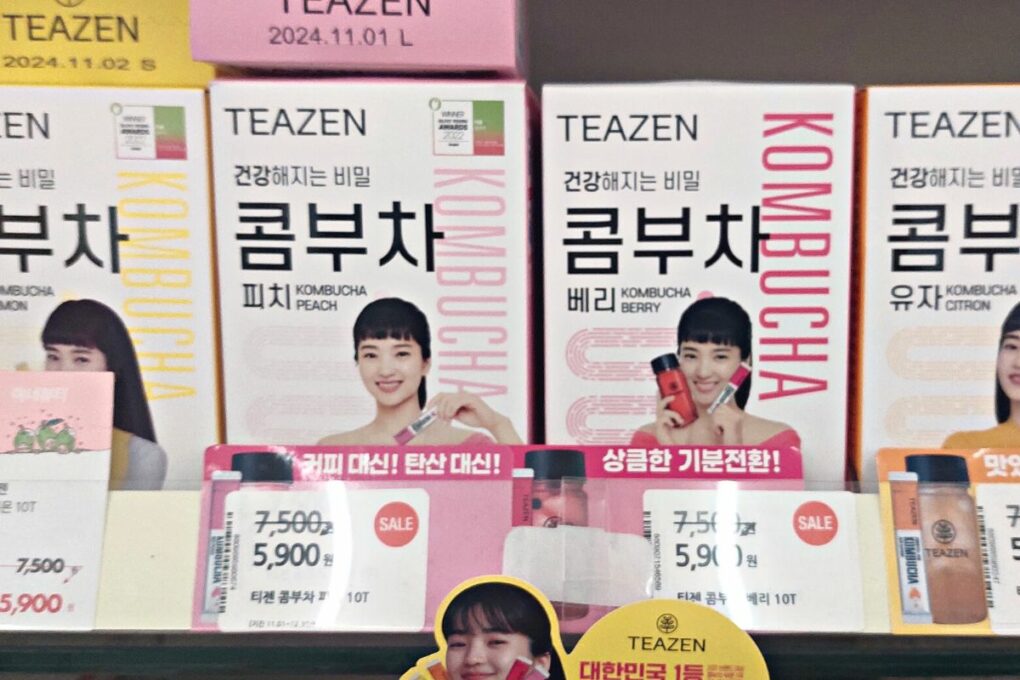
Kombucha is known for aiding in food digestion & weight-loss properties but it was famous in Korea for an entirely different reason. During his live, BTS Jungkook promoted Teazen’s kombucha to his fans.
As a result, there was a shortage of said tea in Korea. It still holds its reputation as one of the best teas in Korea since anything BTS still attracts people’s attention, despite the band recently announcing their hiatus until 2025.
Citron Tea (Yuzu Syrup Tea)
Type of Tea: Jar Syrup
Only in Korea?: Yes
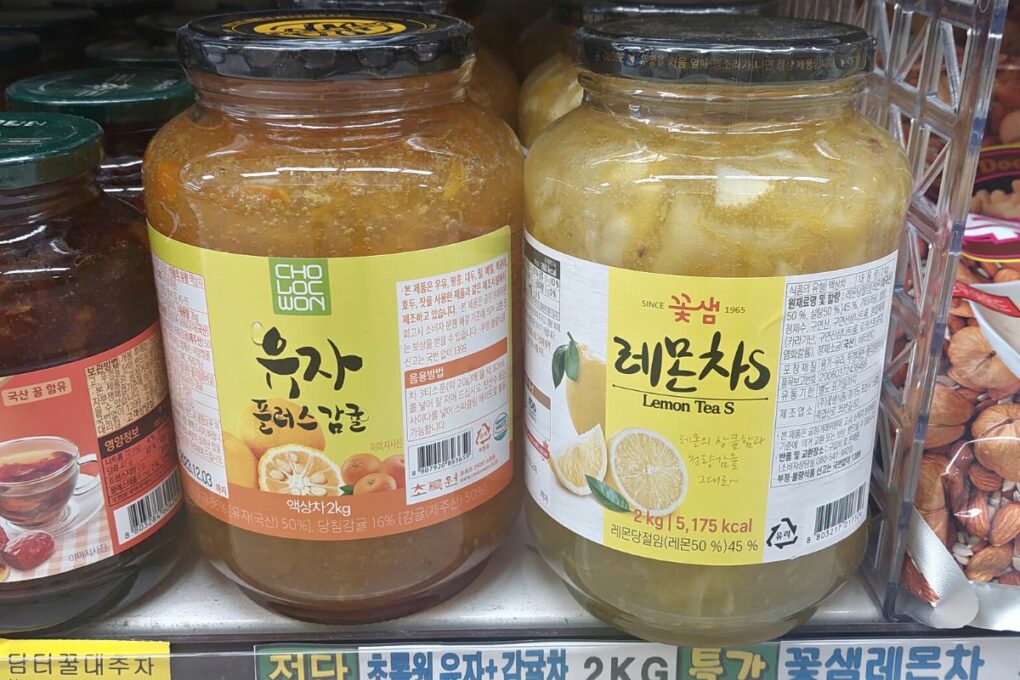
On days when your fingertips feel cold, Korean people crave the taste of hot fruit teas, like 유자 tea (yuzu tea). This scent delightfully lingers at the tip of your nose and comforts you as soon as the sweetness enters your mouth.
This fruit paste is also rich in Vitamin C, citric acid, and folic acid, which do wonders for your skin. When I taught English in Korea, my students loved to have a little glass of yuja tea with their afternoon snacks.
Ottogi Bellat’e Honey Lemon/Grapefruit Black Tea
Type of Tea: Powdered
Only in Korea?: Yes
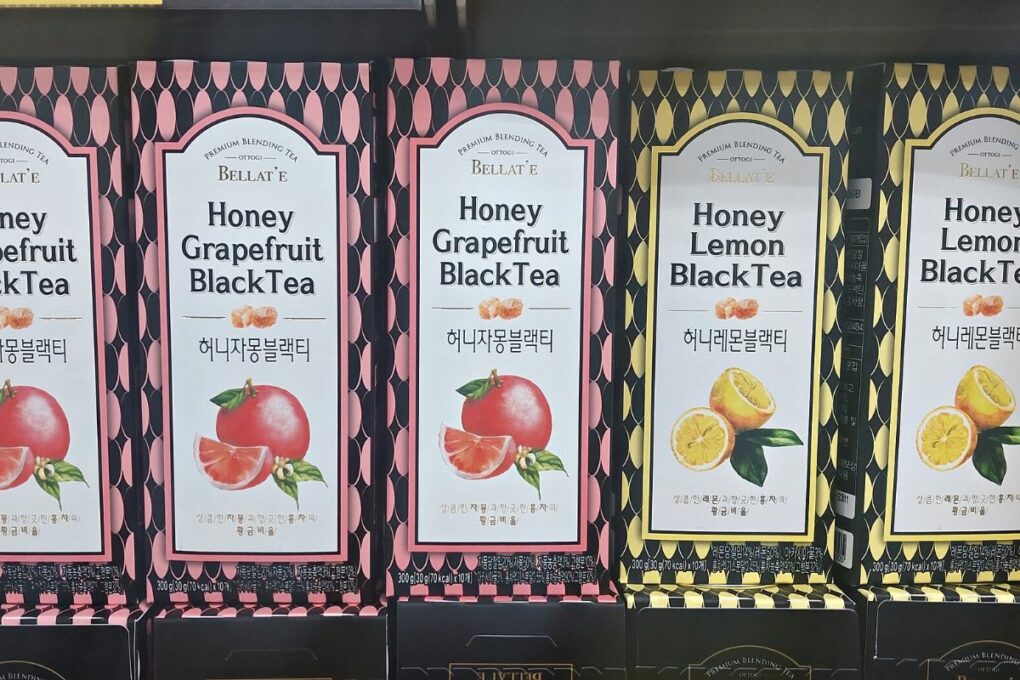
Best enjoyed cold; the Bellat’e series is a refreshing choice if you want to lose weight in the summer. Either flavor of tea helps in digestion since grapefruit and honey are both choices that kickstart your metabolism and aids in digesting nutrients and sugars properly within your system.
Tarra Classic Earl Grey
Type of Tea: Tea bags
Only in Korea?: No, Ebay
Korean people know what Earl Grey is, but many have yet to have the opportunity to try it. The taste is floral and bitter because it is made with bergamot oil and black tea, which activate the release of our digestive enzymes.
However, people often add sugar, milk, or lemon to tame the sometimes-astringent taste.
Tarra Classic Darjeeling
Type of Tea: Tea bags
Only in Korea?: No, Ebay
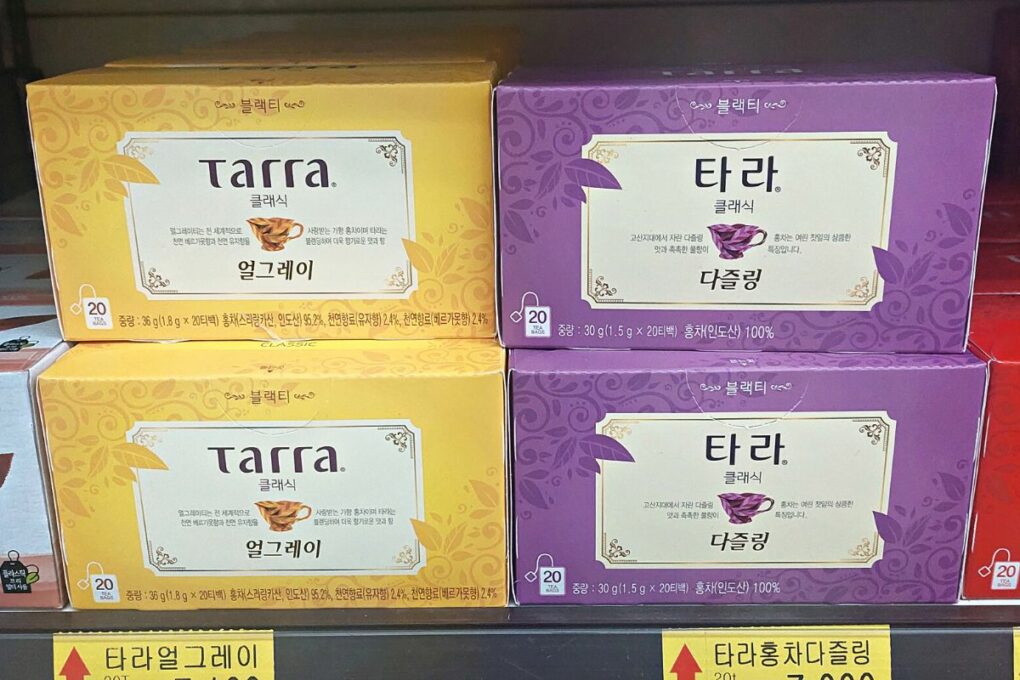
Called the “champagne of teas,” this Indian tea is specifically grown and produced in West Bengal’s Darjeeling district. Known for its fruity smell and golden color, it holds notes of citrus, flowers, and herb-like tastes.
Compared to other types of black tea, Darjeeling tastes sweeter and less acidic than a typical black tea.
LENITH Songwon Bitter Melon Tea
Type of Tea: Tea bags
Only in Korea?: No, Ebay
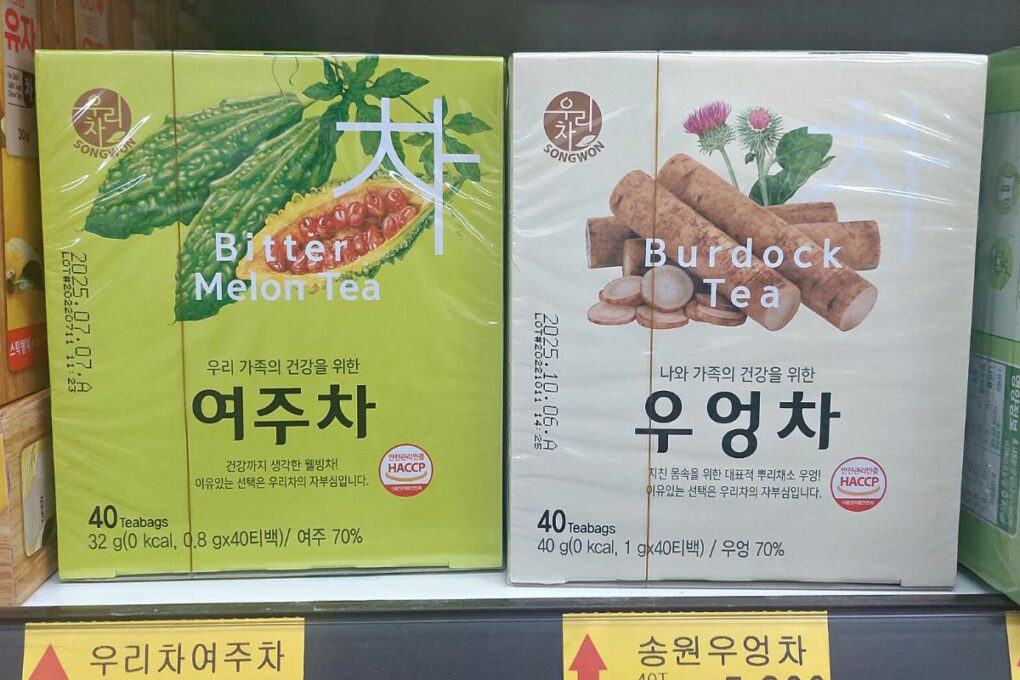
This medicinal tea regulates blood sugar and glucose levels and effectively treats ulcers and hypertension. Even though the product is called "bitter melon," the tea is quite the opposite since it has a mild earthy and vegetal taste that’s pleasantly balanced.
🌸 Korean Flower Teas
Gukhwa-cha 국화차 Chrysanthemum Tea
Average Cost: ₩₩
Where to Buy: Amazon
Gukhwacha, or chrysanthemum tea, is made by drying and preserving chrysanthemum flowers in honey for several weeks. After that, the flowers are steeped in hot water.
Chrysanthemum tea has experienced increased popularity recently, as it’s visually stunning, with the rehydrated flowers appearing to resurrect in a cup of bright yellow tea. This tea contains no caffeine and has a delicate, slightly sweet, floral flavor.
In Korean medicine, chrysanthemum tea was thought to help with varicose veins, colds, as an anti-inflammatory, and as a detoxifier. This popular Korean tea is said to cool down the liver when it becomes overheated as a result of chronic stress.
Dong Suh Buckwheat Tea
Type of Tea: powdered/tea bags/loose leaf tea/bottled or canned
Only in Korea?: No, Amazon
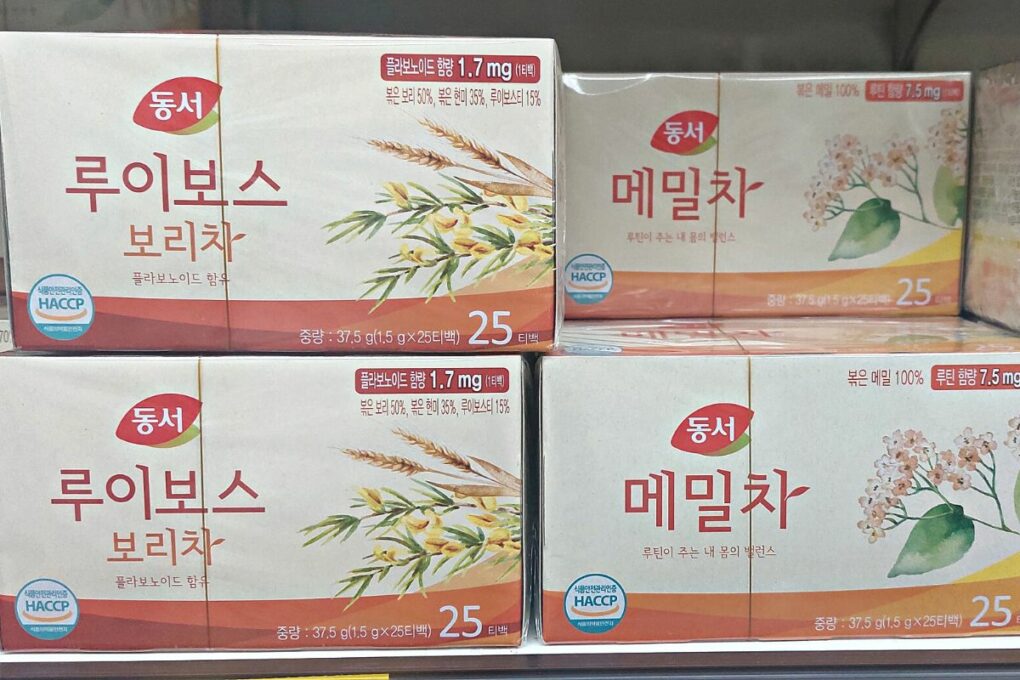
Buckwheat tea, or maemil cha, is a caffeine-free tea with a toasty smell and nutty, sweet flavor that is best enjoyed hot. Locals love this more than water because it contains phenolic acid, which aids digestion and reduces inflammation in the intestines.
Buckwheat also contains rutin, a healthy plant pigment that helps you better absorb nutrients from fruits with Vitamin C.
🌱 Best Korean Herbal Teas
Ssanghwa-cha (쌍화차, Double Harmony Tea)
Average Cost: ₩₩
Where to Buy: Amazon
Ssanghwa-cha is a traditional Korean tea with a deep brown color and a distinct flavor. This popular medicinal tea is also known as Double Harmony Tea.
Angelica root, Cnidium Officinale Makino, Licorice Root, Medicinal Jujube, Rehmannia Glutinosa, Astragalus Root, Ginger, and Cinnamon are among the herbs used. It has a plethora of health benefits that can be obtained simply by adding it to your morning routine.
The strong herbal medicine flavor of Ssanghwa Tea is followed by a slightly bitter aftertaste. The sesame seeds give it an earthy and nutty flavor to balance this out, with a layer of cinnamon and sweetness from the jujubes.
During the Joseon Dynasty, it was considered an herbal bath and was consumed in the morning and at night (1392-1910). Many Koreans buy this pre-made tea, but there are still places in the country that serve freshly-made versions.
O’Food Bokumjari Ginger Tea
Type of Tea: Jar syrup
Only in Korea?: No, Umami Cart
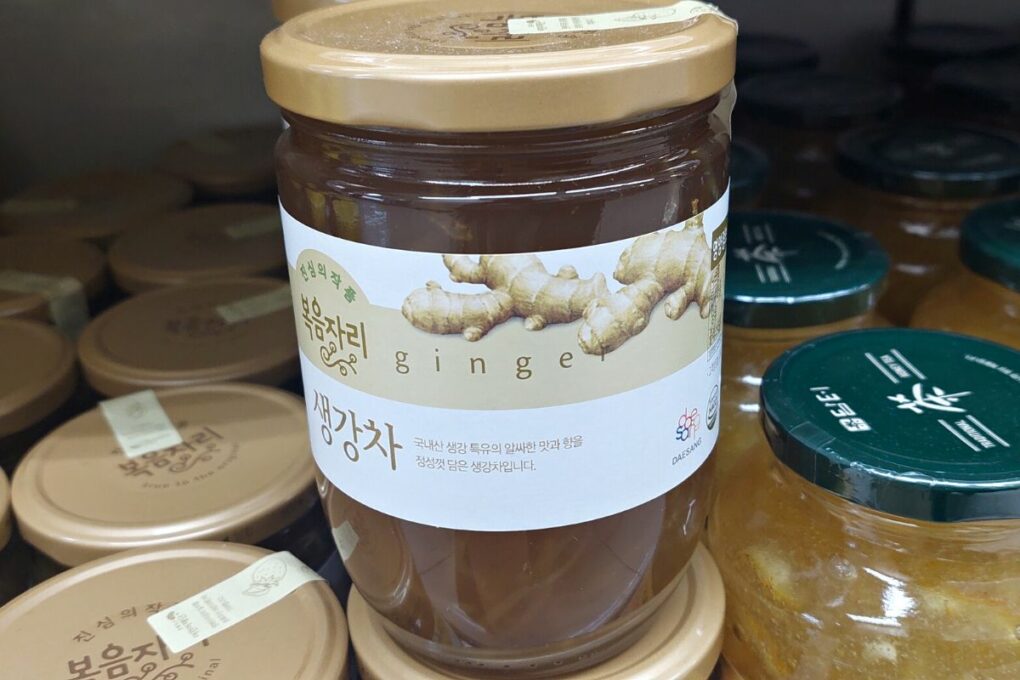
With two teaspoons of this syrup, the spicy ginger in this jar can come off a bit strong and fiery. Still, people enjoy this drink because it soothes the stomach & packs quite a punch that restarts your system after a hot cup.
This tea is also the best remedy for people with a bad sore throat, headache, or stomachache.
Ottogi Honey Ginger Tea
Type of Tea: Jar syrup
Only in Korea?: No, Walmart
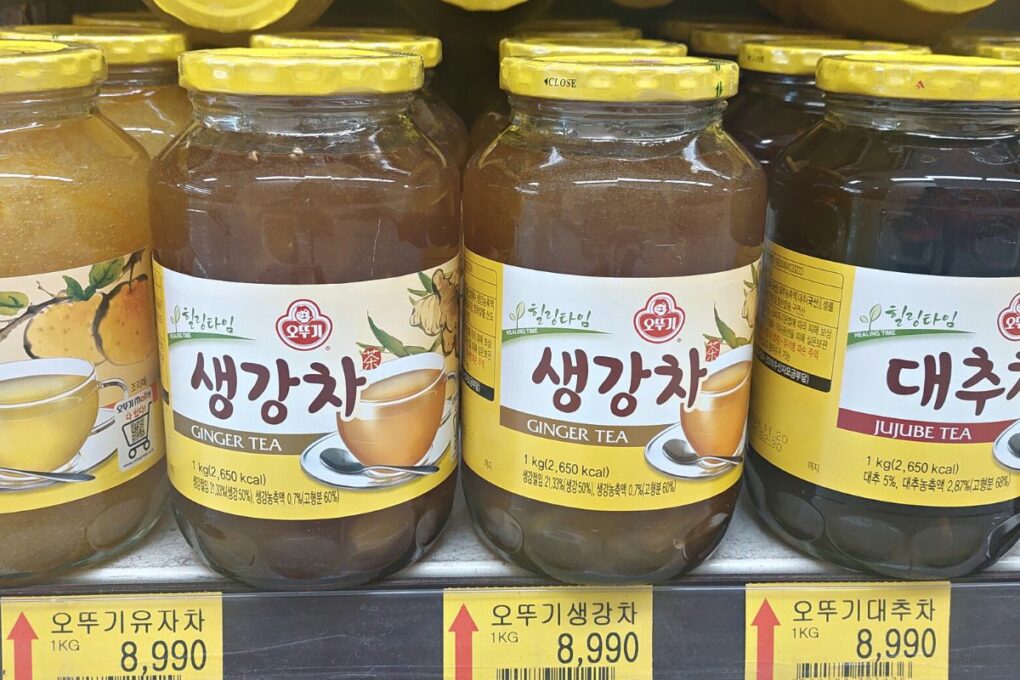
Koreans used to value honey and ginger as precious ingredients, because they reinforce flavor and are each associated with various health benefits.
A spoonful of this Korean tea syrup daily boosts your body’s immune system, preventing the chance of catching colds. And, if you drink this before bed, it can help you sleep soundly at night.
Sipjeondaebotang
Average Cost: ₩₩
Where to Buy: Amazon
In East Asian countries, Sipjeondaebotang has been used as a medicinal tea for centuries. It is more potent than ssangwa-cha because it contains a total of ten medicinal herbs that when blended, completely protect the body.
Ginseng, angelica root, kneeling angelica, peony, milk vetch root, cinnamon, white atractylodes, deer antler, Helen, and foxglove are among the ten ingredients. The ingredients are boiled for an extended period of time with ginger and jujubes, yielding a potent tonic.
Sipjeondaebotang means "wholly and dearly protect and preserve everything" and literally means "harmony of both energy and blood". The infusion is widely used to alleviate fatigue, reduce inflammation, and improve liver function.
Its energizing properties make it an excellent supplement for those recovering from the flu and for boosting the immune system.
Ediya Coffee Pure Peppermint Tea
Type of Tea: Tea bags
Only in Korea?: Yes
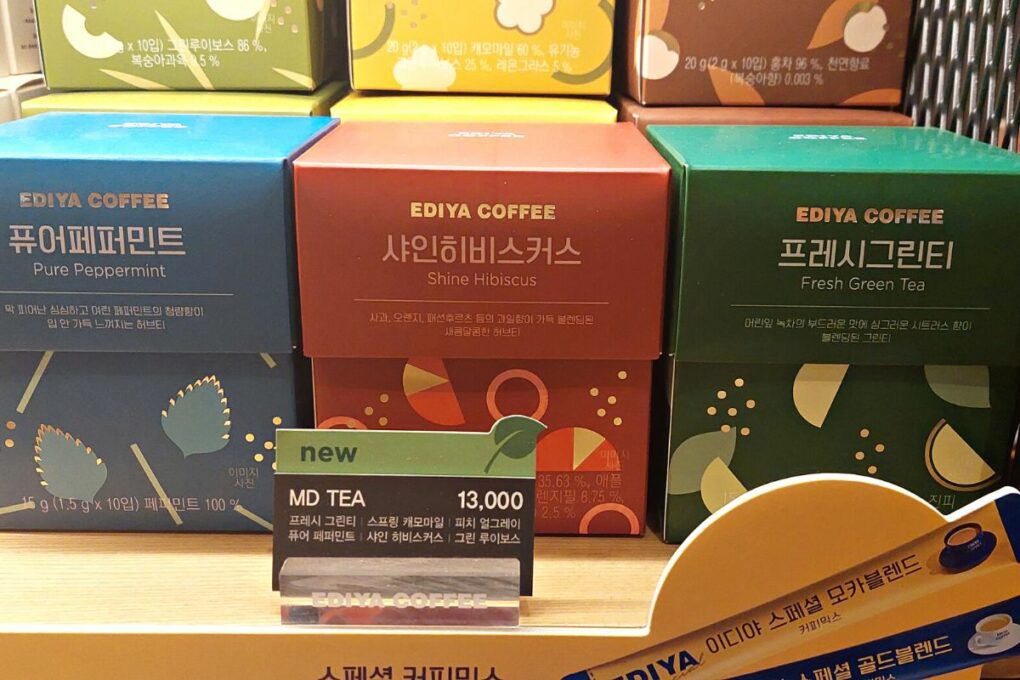
Ediya Coffee is better known for their instant coffee packets, but they also make some fantastic teas. One of these is their peppermint tea, which is said to aid in two things: reducing stress and increasing performance.
Plus, the scent of peppermint helps you remember and process thoughts effectively, making it the perfect study buddy when the exam season rolls around.
Hyeonmi-cha, 현미녹차, or Brown Rice Tea
Average Cost: ₩
Where to Buy: Amazon
Hyeonmi-cha, also known as Brown Rice Tea, has a strong aromatic scent. It is classified as a blended tea, usually with green tea (hyeonmi-nokcha). This tisane is made by roasting rice in a pot and then covering it with boiling water.
Tea should be available in tea bags or roasted form at Asian grocery stores in your area. In addition to the antioxidants found in green tea, Korean brown rice tea is high in vitamins.
B vitamins, vitamin E, protein, and other nutrients that aid in fatigue and recovery, immunity and the prevention of colds, food poisoning, tooth decay, "gum disease," and bad breath. This tea is also beneficial for lowering cholesterol, and has a diuretic effect.
🌾 Best Bottled Korean Teas
Lotte Golden Barley Tea
Type of Tea: Bottled
Only in Korea?: No, Mega Mart
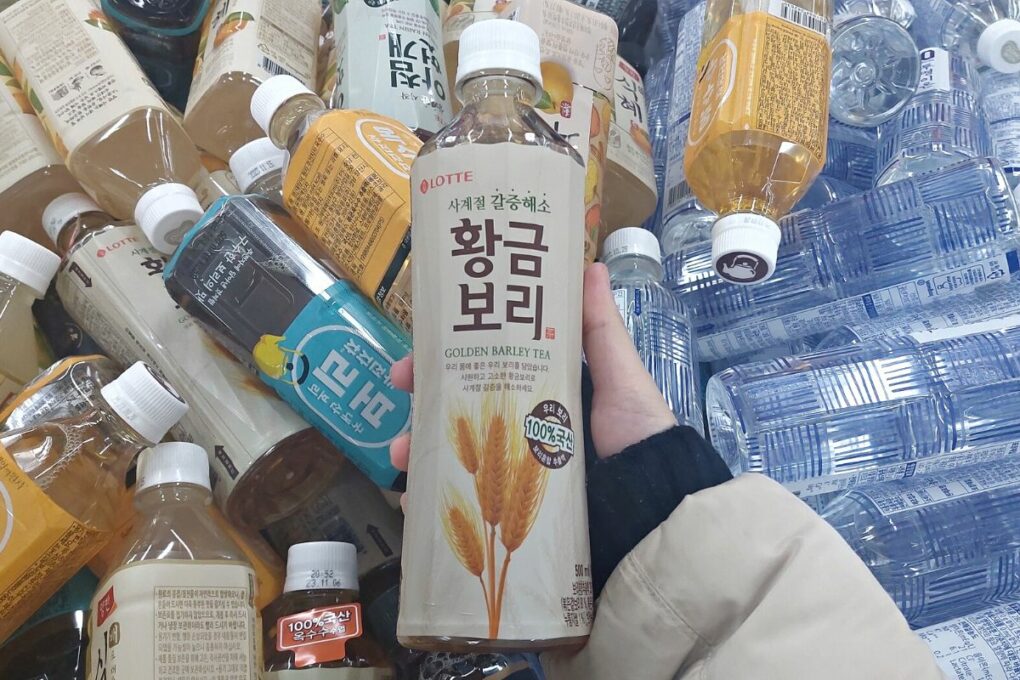
Boricha is the number one choice for people trying to lose weight because of its high fiber content. It tastes like Japanese rice, which is light and nutty, but you can add sugar or stevia to make it a bit sweeter.
People with sleeping issues also drink this tea before bed because it’s thought to help stimulate melatonin production.
Yangban Chilsung Black Tea with Roasted Black Rice
Type of Tea: Bottled
Only in Korea?: No, Yamibuy
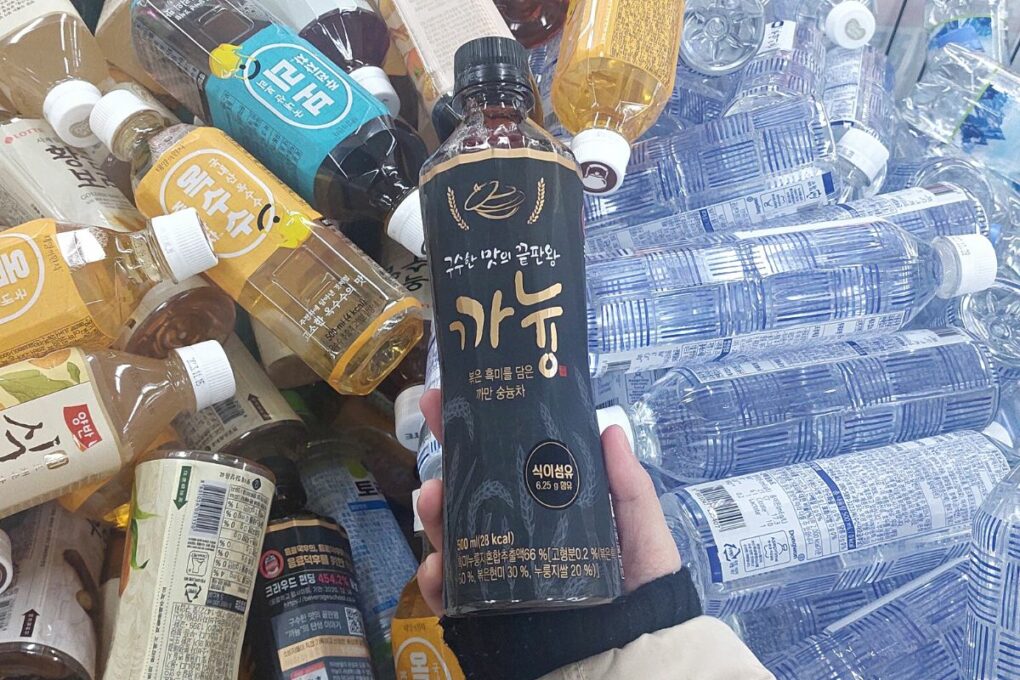
This Korean bottled tea is a ready-to-drink version of sungnyung, a traditional Korean flavor created by pouring water over a crispy layer of rice stuck on the bottom of the pan after cooking rice (nurungji).
Full of fiber, this drink allegedly boosts overall fitness, and the high presence of carotenoids like lutein and zeaxanthin can help promote eye health.
Lotte Corn Silk Tea
Type of Tea: Bottled
Only in Korea?: No, MegaKFood
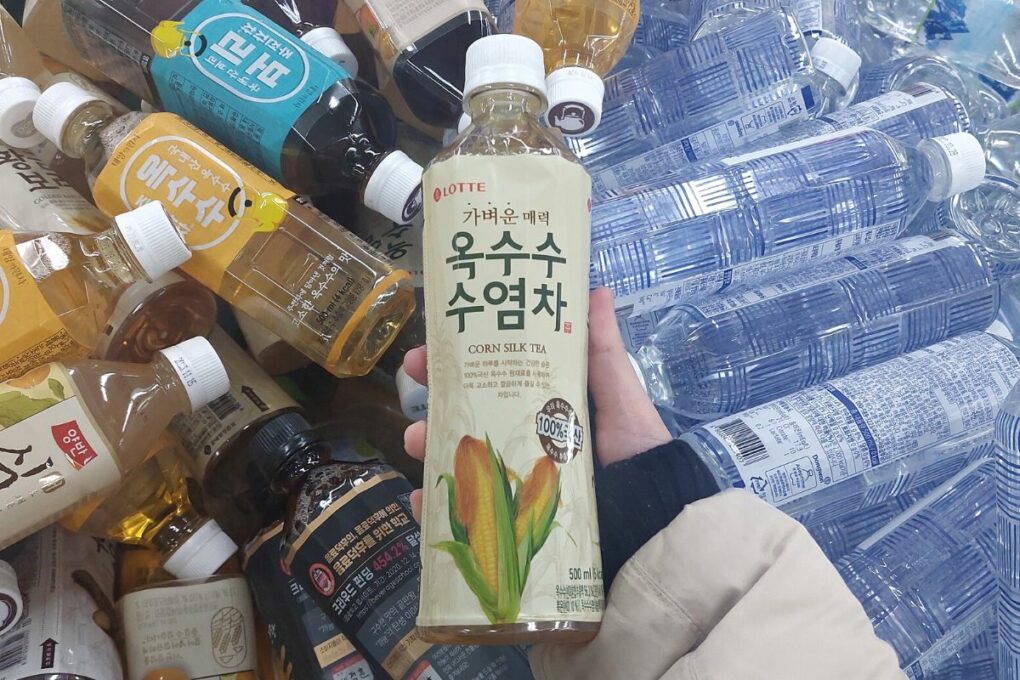
Made with corn silk, those whitish fibers you see on a corn cob, this mild herbal tea is believed to have many medicinal properties. In Korea, those with urinary tract problems drink this to flush out toxins in the bladder. The taste can be very mild, so most Koreans recommend blending this with honey.

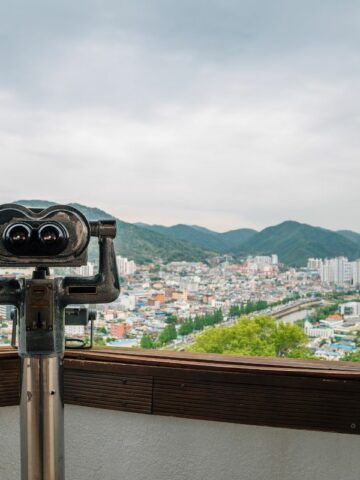
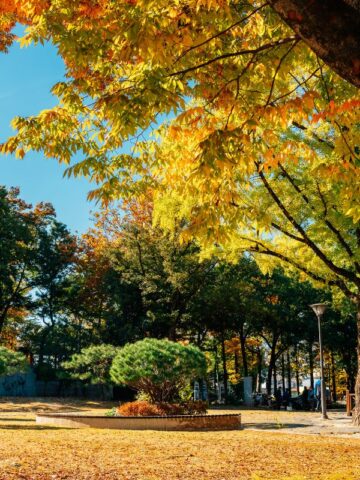
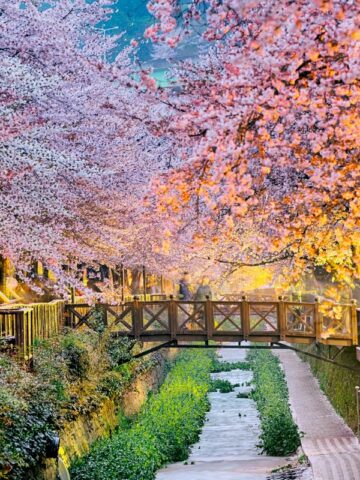
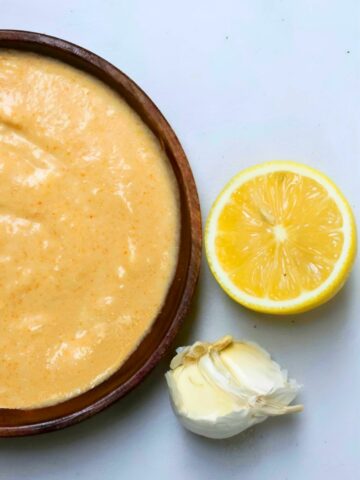
Comments
No Comments